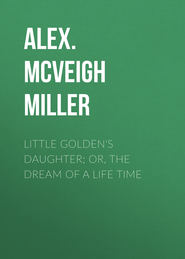По всем вопросам обращайтесь на: info@litportal.ru
(©) 2003-2024.
✖
Lancaster's Choice
Автор
Год написания книги
2018
Настройки чтения
Размер шрифта
Высота строк
Поля
He thought apprehensively.
"It was most unwise in Mrs. West to allow her niece to go roaming about alone at this hour. Even upon my grounds she may lose her way, or meet with some unpleasant adventure. I will follow her at a safe distance, and see that she gets back safely to the Hall."
He set out hurriedly, and, turning the bend in the road, almost ran over two figures standing motionless under the tall trees that bordered the lane—Mrs. West, with Leonora sobbing in her arms.
The good woman, looking up, uttered a cry of relief.
"Oh, Lord Lancaster! I am so glad to see you," she exclaimed. "I am so frightened. Something must have happened to Leonora. You see how she's crying. Well, she came out for a breath of fresh air, and then she wanted to hear the nightingales at the Magic Mirror, and so I sat down and waited for her; but she stayed so long, I went to look for her; and there she came flying into my arms, and crying like some hurt thing. Did you see anything or any person, my lord?" anxiously.
He was intensely annoyed. The sight of Leonora sobbing grievously in the woman's arms bitterly irritated him.
Why would she misjudge him so persistently? why misunderstand him always?
He looked at the graceful black figure with its head bowed on Mrs. West's plump shoulder, and said, curtly:
"Miss West is unnecessarily alarmed. She has seen no one or nothing but myself. It was the sight of me that alarmed her."
"Oh, hush! I did not mean to tell her!" cried Leonora through her sobs.
There was a note of warning in her voice; but in his vexation he did not heed it.
Mrs. West was looking at him anxiously.
"Of course, she would not have been frightened at the sight of you, my lord!" she exclaimed.
"I—was not frightened at anything—I was only angry," Leonora said, lifting her head at this moment, and hushing her low sobs into silence. "He had no right, Aunt West," she added, incoherently.
"No right!" echoed the good woman, looking from one to the other in amazement. "Why, what has he done, my dear?"
"Nothing; only looked over my shoulder into the water—and—and frightened me. Please don't think me silly, Aunt West. I think I'm nervous to-night. Let us go," said the girl, without looking at the tall, handsome form standing so near her.
"Let me come to-morrow and explain," he said, humbly, coming nearer to her; but she turned her face resolutely from him.
"No," she said, icily; "it is quite unnecessary. Come, Aunt West."
She dragged the good woman away, and left him standing there in the moonlight, with a settled shadow upon his face.
"What a contretemps!" he said to himself, gloomily. "Ah! how little I thought, when I came out to-night to smoke that solitary cigar, that I should meet with such an adventure! How angry she was! Every time we meet we drift further away from each other!"
He went back to Lady Adela and his guests after awhile. The earl's daughter chided him because he had left them for that odious cigar.
"It was most ungallant!" she declared.
"You are mistaken. I went to consult that oracle, the Magic Mirror," he replied.
Lady Adela had heard the old legend. She smiled and bridled.
"Did you see your fate?" she asked him; and he answered, in a strange tone:
"I saw the woman I love in the Magic Mirror."
The earl's beautiful daughter was a little puzzled by his reply. She wondered if hers was the face he had seen in the water, but she dared not put the thought into words.
CHAPTER XXV
Several days passed away very quietly after Leonora's first day and night at Lancaster Park. The girl stayed in the small rooms to which she was restricted quite as closely as the housekeeper could have desired. She did not even offer to go out, seeming to have tacitly resigned herself to the situation.
She unpacked one of her trunks and showed Mrs. West the sketches she had promised to show her; she took out all her pretty, simple black dresses, and hung them on their pegs in the little dressing-closet her aunt assigned her.
When she had nothing else to do she read or embroidered. Her aunt noted with pleasure that she was seldom idle.
She did not know of the long hours Leonora spent, when alone, curled up in a big easy-chair, with her milk-white hands folded in her lap, her eyes half shut, with the dark lashes drooping against the pink cheeks, and a thoughtful, puzzled expression on the fair face.
If she had seen her, Mrs. West would have wondered much what her niece was thinking about.
In the meantime, the gay life of the great folks at Lancaster went on from day to day.
Leonora saw no more of it, steadily declining the well-meant offers of her aunt to provide her with surreptitious peeps at it.
"I do not care about it," Leonora would say, with an eloquent glance at her black dress. "Gayety only jars upon me, auntie, dear. I should like to go out in the fresh air a little; but if I can not do that, I have no desire for the rest."
But Mrs. West, however willing she was, did not dare advise her niece to go out into the grounds where the guests might be encountered at any time, or even old Lady Lancaster herself.
She knew that Leonora's pretty face, once seen by the guests, would excite remark. It had already won the admiration of the house-maids.
These latter persons, having caught occasional glimpses of Leonora in their errands to the housekeeper's room, were disposed to be very sociable with the fair American girl; but Mrs. West put an end to their well-meant cordialities by saying, gently:
"My niece would rather not be disturbed; she is in great trouble; she has recently lost her father."
After that the maids did not court Leonora's society any more. They accepted her aunt's excuse good-naturedly and sympathetically, and contented themselves by talking about her among themselves, and praising her beauty, which they declared to each other was even greater than that of the young ladies who were sojourning at Lancaster—greater even than that of Lady Adela Eastwood, who, it was confidently whispered, was to be the next mistress of Lancaster Park.
Mrs. West grew downright sorry for her pretty prisoner, whose pink cheeks were fading in the close, dark rooms where she was kept. She said to herself that this would not do. She must not have poor Dick's orphan child pining for liberty and light and the blessed sunshine that was free to all.
"I will not do it; no, not if I have to leave Lady Lancaster's service and make a home for the girl elsewhere," she said to herself.
So one day she came into the little room where Leonora, sitting at the window, gazed wistfully out at the green grass and the blue sky, with an unconscious pathos on the sweet, girlish face.
"My dear, you are tired of this stuffy little chamber, I know," she said.
"Not very," said the girl, a little drearily. "I suppose I ought to be grateful to you for giving me such a home."
"Grateful to me for hiding you away in these little musty rooms, as if you hadn't the sweetest face the sun ever shone on!" cried the good woman, self-reproachfully. "Not a bit of it, my dear. I'm ashamed of myself for treating you so. It mustn't go on so, or your health will suffer, and so I shall tell Lady Lancaster; and if she won't allow you the liberty of the grounds, I will go away from here and make us a snug little home somewhere else, where we may come and go as we please; so there!" said the good woman, with sudden independence.
Leonora rose impulsively and went and kissed the homely face of her friend.
"Aunt West, would you really do that much for me?" she exclaimed, delightedly.
"Yes, I would," Mrs. West answered, firmly. "Poor Dick left you to me to take care of, and I'm bound to do the best I can for your happiness."
"It was most unwise in Mrs. West to allow her niece to go roaming about alone at this hour. Even upon my grounds she may lose her way, or meet with some unpleasant adventure. I will follow her at a safe distance, and see that she gets back safely to the Hall."
He set out hurriedly, and, turning the bend in the road, almost ran over two figures standing motionless under the tall trees that bordered the lane—Mrs. West, with Leonora sobbing in her arms.
The good woman, looking up, uttered a cry of relief.
"Oh, Lord Lancaster! I am so glad to see you," she exclaimed. "I am so frightened. Something must have happened to Leonora. You see how she's crying. Well, she came out for a breath of fresh air, and then she wanted to hear the nightingales at the Magic Mirror, and so I sat down and waited for her; but she stayed so long, I went to look for her; and there she came flying into my arms, and crying like some hurt thing. Did you see anything or any person, my lord?" anxiously.
He was intensely annoyed. The sight of Leonora sobbing grievously in the woman's arms bitterly irritated him.
Why would she misjudge him so persistently? why misunderstand him always?
He looked at the graceful black figure with its head bowed on Mrs. West's plump shoulder, and said, curtly:
"Miss West is unnecessarily alarmed. She has seen no one or nothing but myself. It was the sight of me that alarmed her."
"Oh, hush! I did not mean to tell her!" cried Leonora through her sobs.
There was a note of warning in her voice; but in his vexation he did not heed it.
Mrs. West was looking at him anxiously.
"Of course, she would not have been frightened at the sight of you, my lord!" she exclaimed.
"I—was not frightened at anything—I was only angry," Leonora said, lifting her head at this moment, and hushing her low sobs into silence. "He had no right, Aunt West," she added, incoherently.
"No right!" echoed the good woman, looking from one to the other in amazement. "Why, what has he done, my dear?"
"Nothing; only looked over my shoulder into the water—and—and frightened me. Please don't think me silly, Aunt West. I think I'm nervous to-night. Let us go," said the girl, without looking at the tall, handsome form standing so near her.
"Let me come to-morrow and explain," he said, humbly, coming nearer to her; but she turned her face resolutely from him.
"No," she said, icily; "it is quite unnecessary. Come, Aunt West."
She dragged the good woman away, and left him standing there in the moonlight, with a settled shadow upon his face.
"What a contretemps!" he said to himself, gloomily. "Ah! how little I thought, when I came out to-night to smoke that solitary cigar, that I should meet with such an adventure! How angry she was! Every time we meet we drift further away from each other!"
He went back to Lady Adela and his guests after awhile. The earl's daughter chided him because he had left them for that odious cigar.
"It was most ungallant!" she declared.
"You are mistaken. I went to consult that oracle, the Magic Mirror," he replied.
Lady Adela had heard the old legend. She smiled and bridled.
"Did you see your fate?" she asked him; and he answered, in a strange tone:
"I saw the woman I love in the Magic Mirror."
The earl's beautiful daughter was a little puzzled by his reply. She wondered if hers was the face he had seen in the water, but she dared not put the thought into words.
CHAPTER XXV
Several days passed away very quietly after Leonora's first day and night at Lancaster Park. The girl stayed in the small rooms to which she was restricted quite as closely as the housekeeper could have desired. She did not even offer to go out, seeming to have tacitly resigned herself to the situation.
She unpacked one of her trunks and showed Mrs. West the sketches she had promised to show her; she took out all her pretty, simple black dresses, and hung them on their pegs in the little dressing-closet her aunt assigned her.
When she had nothing else to do she read or embroidered. Her aunt noted with pleasure that she was seldom idle.
She did not know of the long hours Leonora spent, when alone, curled up in a big easy-chair, with her milk-white hands folded in her lap, her eyes half shut, with the dark lashes drooping against the pink cheeks, and a thoughtful, puzzled expression on the fair face.
If she had seen her, Mrs. West would have wondered much what her niece was thinking about.
In the meantime, the gay life of the great folks at Lancaster went on from day to day.
Leonora saw no more of it, steadily declining the well-meant offers of her aunt to provide her with surreptitious peeps at it.
"I do not care about it," Leonora would say, with an eloquent glance at her black dress. "Gayety only jars upon me, auntie, dear. I should like to go out in the fresh air a little; but if I can not do that, I have no desire for the rest."
But Mrs. West, however willing she was, did not dare advise her niece to go out into the grounds where the guests might be encountered at any time, or even old Lady Lancaster herself.
She knew that Leonora's pretty face, once seen by the guests, would excite remark. It had already won the admiration of the house-maids.
These latter persons, having caught occasional glimpses of Leonora in their errands to the housekeeper's room, were disposed to be very sociable with the fair American girl; but Mrs. West put an end to their well-meant cordialities by saying, gently:
"My niece would rather not be disturbed; she is in great trouble; she has recently lost her father."
After that the maids did not court Leonora's society any more. They accepted her aunt's excuse good-naturedly and sympathetically, and contented themselves by talking about her among themselves, and praising her beauty, which they declared to each other was even greater than that of the young ladies who were sojourning at Lancaster—greater even than that of Lady Adela Eastwood, who, it was confidently whispered, was to be the next mistress of Lancaster Park.
Mrs. West grew downright sorry for her pretty prisoner, whose pink cheeks were fading in the close, dark rooms where she was kept. She said to herself that this would not do. She must not have poor Dick's orphan child pining for liberty and light and the blessed sunshine that was free to all.
"I will not do it; no, not if I have to leave Lady Lancaster's service and make a home for the girl elsewhere," she said to herself.
So one day she came into the little room where Leonora, sitting at the window, gazed wistfully out at the green grass and the blue sky, with an unconscious pathos on the sweet, girlish face.
"My dear, you are tired of this stuffy little chamber, I know," she said.
"Not very," said the girl, a little drearily. "I suppose I ought to be grateful to you for giving me such a home."
"Grateful to me for hiding you away in these little musty rooms, as if you hadn't the sweetest face the sun ever shone on!" cried the good woman, self-reproachfully. "Not a bit of it, my dear. I'm ashamed of myself for treating you so. It mustn't go on so, or your health will suffer, and so I shall tell Lady Lancaster; and if she won't allow you the liberty of the grounds, I will go away from here and make us a snug little home somewhere else, where we may come and go as we please; so there!" said the good woman, with sudden independence.
Leonora rose impulsively and went and kissed the homely face of her friend.
"Aunt West, would you really do that much for me?" she exclaimed, delightedly.
"Yes, I would," Mrs. West answered, firmly. "Poor Dick left you to me to take care of, and I'm bound to do the best I can for your happiness."











